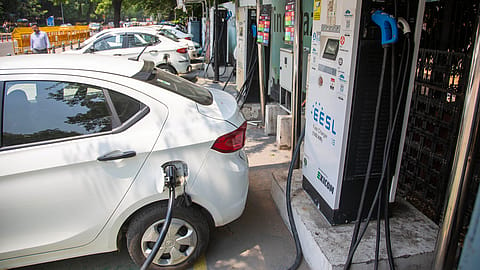Budget 2024: EV industry wants GST rate rationalisation, investment in charging infra
Expanding EV infrastructure is essential for promoting widespread EV adoption in India, say industry executives.

Several automakers and auto component manufacturers are batting for rationalisation of GST (Goods and Services Tax) rates on electric vehicles and its components.
Auto component industry body ACMA has proposed several key measures to further bolster the auto sector. These include incentivising capex expenditure by reintroducing additional investment allowance provision, increasing depreciation rates on plant and machinery in the auto component industry from 15% to 25%, and rationalising GST rates on EVs and its components.
“ACMA is looking forward to a growth-oriented budget with continued thrust on reforms and infrastructure development. Schemes such as the PLI have been of great support to the automotive industry, and we are hopeful that such measures will be continued,” says Shradha Suri Marwah, president of ACMA.
To meet the ambitious target of increasing EV penetration, substantial additional measures are required, says Sulajja Firodia Motwani, founder and CEO of Kinetic Green.
“We are anticipating the announcement of FAME 3 in the upcoming Budget to sustain and accelerate EV demand, especially since the current scheme is set to end on July 31. The industry urgently calls for the continuation of the FAME scheme with a clear roadmap for the next 3 to 5 years. This continuity is crucial for maintaining the momentum of investments and efforts towards EV adoption,” says Motwani.
“We request support for the development of charging infrastructure in key corridors of 10-15 major cities and surrounding highways. This will be pivotal in promoting the use of electric four-wheelers (e4W) and commercial vehicles (CVs) across India,” says Motwani.
GST reforms has been an ask from the EV sector, specifically reduction of GST on lithium-ion batteries to 5% (from current rate of 18%) and the lowering of GST on EV charging services to 5%, Motwani says, adding that these changes will significantly enhance the affordability and overall ownership experience of EVs for customers,.
Recommended Stories
In the upcoming Budget, the industry seeks a level playing field for all technologies, emphasising the need to address disparities in GST and subsidies, particularly for swappable batteries, says Chetan Maini, co-founder and chairman, SUN Mobility.
“Anticipated measures include a comprehensive Battery Swapping Policy, the launch of FAME III, with an increased allocation for e-buses, and proposals to incentivise local production of EV components, all aimed at fortifying India’s EV ecosystem,” Maini says.
To achieve net-zero carbon emissions, the government must focus on maintaining policy continuity, says Akash Gupta, co-founder and CEO of Zypp Electric. “Inclusion in the priority lending scheme and reducing GST for EV services from 18% to 5% will accelerate EV-led delivery adoption…An extension of the existing EMPS scheme will result in better stakeholder sentiment and investor confidence,” says Gupta.
Expanding EV infrastructure is essential for promoting widespread EV adoption in India, and financial incentives will significantly boost the growth of charging network, says Niranjan Nayak, managing director, Delta Electronics India. “We also hope for tax reforms that support our industry and encourage consumers to transition to electric vehicles. Developing a robust EV charging ecosystem, particularly in Tier II and Tier III cities, is vital. Prioritising open data standards and APIs for charging networks will ensure interoperability and enhance user experience,” says Nayak.
(INR CR)
The focus on strengthening EV manufacturing and expanding infrastructure, especially charging facilities, is encouraging, says Kartikey Hariyani, founder and CEO, CHARGE ZONE. “Proposed measures to promote e-buses and enhance payment security are crucial for accelerating sustainable transportation. Comprehensive support for the entire EV ecosystem is essential. Anticipated policy reforms like FAME-III and increased funding for critical EV segments will foster holistic industry growth,” says Hariyani.
Significant investment in EV charging infrastructure across urban and rural areas will create a sustainable network supporting the rapid growth of electric vehicles nationwide, Hariyani adds.
By prioritising R&D and cross-sectoral collaboration in clean tech and mobility, the budget should aim to drive both innovation and economic growth, says Sunjay Kapur, chairman, Sona Comstar. “We anticipate robust support for electric mobility with a focus on building charging infrastructure, that will help instil confidence in consumers to embrace electric vehicles. The new EV policy has already solidified India's position as a key EV manufacturing hub. However, rationalising GST rates on components has been a big ask and the industry expects some development in that direction,” Kapur adds.
Commercial vehicles are one of the most polluting segments of road transportation and account for 65-70% of total vehicular pollution and decarbonising this segment should be a priority for the government, says Inderveer Singh, CEO and founder, EVage.